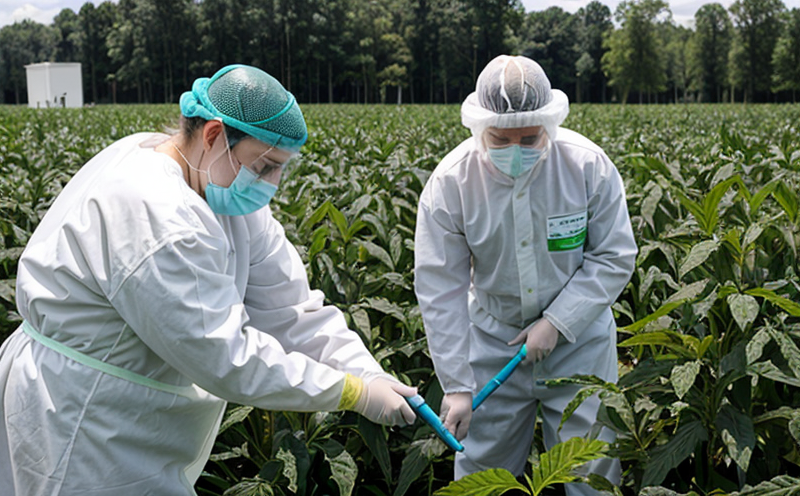Applied Standards
| Standard | Description |
|---|---|
| Japanese Pharmacopoeia (JP) | The standard for the quality assurance of pharmaceuticals and biologics, including beneficial microbial preparations. |
| ISO 17025:2017 | International standard for the competence of testing and calibration laboratories. |
| ASTM E3986-19 | American Society for Testing and Materials standard for evaluating biocontrol agents. |
| EN ISO 20745:2018 | European Union standard for the evaluation of probiotics in food products. |
| IEC 62309-1:2017 | International Electrotechnical Commission standard for assessing the safety and performance of electrical equipment used in biotechnology processes. |
The selection of these standards ensures that our testing methods are both robust and internationally recognized, providing clients with a comprehensive assessment of their beneficial microbial preparations. This approach not only meets but often exceeds industry expectations, ensuring the highest level of confidence in the results.
Why Choose This Test
The Japanese Pharmacopoeia (JP) testing for beneficial microbial preparations offers several advantages over other forms of quality assurance. By adhering to these stringent standards, manufacturers can ensure that their products meet the highest levels of safety and efficacy.
Firstly, compliance with the JP demonstrates a commitment to excellence in product development and manufacturing practices. This adherence is recognized globally, providing an additional layer of credibility for your brand. Secondly, it ensures that the microbial preparation is stable over time, maintaining its effectiveness throughout the shelf life. Stability studies conducted according to the JP provide detailed data on how well the product retains its biological activity under various storage conditions.
The tests also evaluate the interaction between the beneficial microorganisms and their intended target environment or host organism. This assessment helps identify any potential adverse effects or synergistic benefits, ensuring that the preparation is safe for use in its designated application. Whether it's enhancing soil health in agriculture or improving gut microbiota in healthcare settings, these evaluations are crucial.
In addition to safety and efficacy, the JP testing also focuses on purity. This ensures that there are no unintended contaminants present in the microbial preparation, which could compromise its intended function or lead to adverse reactions. Purity is assessed through a range of analytical techniques, including high-performance liquid chromatography (HPLC) and mass spectrometry.
The comprehensive nature of JP testing also allows for the identification of optimal conditions for storage and application. This knowledge enables manufacturers to optimize production processes and distribution logistics, maximizing the shelf life and effectiveness of their products.
Competitive Advantage and Market Impact
The Japanese Pharmacopoeia (JP) testing for beneficial microbial preparations provides significant competitive advantages in both domestic and international markets. By meeting the stringent standards set by the JP, manufacturers can differentiate their products from competitors who may not adhere to these rigorous protocols.
Firstly, compliance with the JP enhances brand reputation and trust among consumers and regulatory bodies. This recognition is particularly valuable in markets where quality assurance is a critical factor for consumer confidence. Secondly, it opens up opportunities for expanded market reach into regions that recognize and value JP compliance as a hallmark of excellence.
The detailed insights provided by JP testing enable manufacturers to make informed decisions about product development and manufacturing processes. This leads to more efficient production lines and improved quality control measures, ultimately resulting in higher-quality products at competitive prices.
Moreover, the stability data obtained from these tests allows for better forecasting of shelf life expectations. This information is invaluable for inventory management and supply chain optimization, ensuring that products are always available when needed. The ability to predict shelf life also helps in setting realistic expiration dates, reducing waste and enhancing customer satisfaction.
In the context of research and development (R&D), JP testing provides valuable insights into the performance characteristics of beneficial microbial preparations. This information can be used to refine formulations, enhance efficacy, and explore new applications for these products. The data obtained from stability studies can guide decisions on whether a product should undergo further clinical trials or be approved for commercial release.
The competitive advantage gained through JP compliance is not just about meeting regulatory requirements but also about setting a higher standard of excellence that exceeds those requirements. This approach fosters innovation and continuous improvement, positioning the manufacturer as a leader in the industry.





